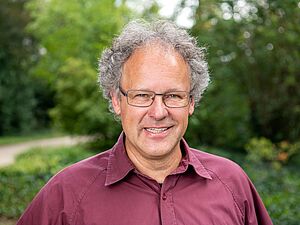"The urgency is similar to that of climate change"
Voices on biodiversity
Martin Bossard worked as Head of Policy at Bio Suisse, the umbrella organisation for Swiss organic farmers since 2009. He retired at the end of September. He will continue to be politically active on behalf of agriculture, including as Co-President of the Association for GMO-free Food.
In the referendum campaign for the biodiversity initiative, on which the Swiss voted on 22 September, production and biodiversity were contrasted with each other - how compatible are they?
Without consideration for our wild animals and plants, there can be no long-term production. That is why Bio Suisse is always in favour of production that works hand in hand with biodiversity.
The referendum campaigns in Switzerland surrounding initiatives reduce the complexity of an issue to a few buzzwords - is this a disservice to biodiversity?
Yes, the very fact that we are talking about the abstract "biodiversity" and not about wild animals, plants and other living beings and their rights is an inadmissible reduction. Incidentally, science tells us that a mass extinction is taking place. The urgency is similar to that of climate change, but the leading farmers' organisation does not want to talk about it.
Are you experiencing hardened fronts here?
Yes, it's hard to bear.
The biodiversity initiative also included a section on sites and cultural monuments - wasn't that too much of a good thing?
Unfortunately, Parliament missed the opportunity to set the right focus with a counter-proposal so that the initiative could have been withdrawn. The National Council was in favour by a large majority, while the Council of States, under pressure from the farmers' association, was against. The new Article 78a proposed by the initiative reinforces the existing constitutional mandates in Article 78 because many of the cantons responsible have been slow to implement it for years. In this respect, the internal logic is clear. However, it would have been wiser for the referendum campaign if the initiative had only addressed the issue of biodiversity.
The 3.5 percent biodiversity promotion areas on arable land have already been buried by Parliament. Is there a risk that the federal government's biodiversity promotion measures will be scaled back even further after Sunday's "no" vote?
Yes, unfortunately that could be a consequence of this.
What will happen to biodiversity at Bio Suisse after the vote? Are there any plans for future development in this area?
Organic farms already achieve above-average results and can increase their performance with the existing measures and benefit from direct payments. The Bud regulations (Bud = Bio Suisse label, editor's note) continue to apply, and the farms can voluntarily do much more than the twelve mandatory measures in the guidelines. Networking, farming expertise and advice are crucial for success.
Since the agricultural initiatives, hardly any compromises have been reached in the form of counter-proposals - has the instrument of the initiative had its day?
No. It must be possible to negotiate compromises again. The farmers' association has already learnt several times in the past that the people will put it back in its place if it becomes too dominant and ruthless. This may soon be the case when it comes to genetic engineering. Bio Suisse strongly supports the new popular initiative "In favour of GMO-free food (food protection initiative)".
Speaking of the food protection initiative - you are Co-President of the Association for GMO-free Food, which launched the initiative. Why are people resorting to this means here?
Because a rough block needs a rough wedge. The agro-industry lobby around Syngenta and Bayer is currently using its full power in Parliament, and the federal councillor responsible is using every political trick in the book, as it has just demonstrated again with its U-turn on the construction of new nuclear power plants. This is why we must call on the people for help in this case, so that we are not force-fed genetically modified food in the near future.
Interview: Corinne Obrist, FiBL




